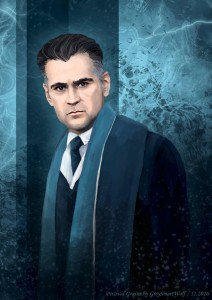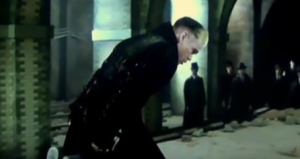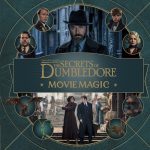J.K. Rowling Reveals Truth Behind Grindelwald’s ‘Vision’
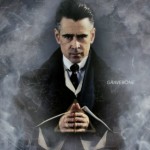
Dec 21, 2016
Fantastic Beasts, Fantastic Beasts Movie, Film Images, Films, JKR Interviews, News, Warner Bros.
**Warning: Fantastic Beasts spoilers below**
Even Professor Trelawney couldn’t have seen this coming!
Following on from last week’s announcement that Gellert Grindelwald is an Occlumens, J.K. Rowling has given fans another exclusive tidbit of information concerning the dark wizard’s true powers.
One fan decided to pick up on another unexplained scene that revolves around Grindelwald while he was under the disguise of Percival Graves. She wrote:
@jk_rowling what did Graves-Grindelwald mean when he said: ”My vision showed only the child’s immense power”? Is he a Seer or was he lying?
— Cheylianie ‡ (@ParselmouthLord) December 19, 2016
 In the scene, Mr. Graves approaches Credence and asks him to search for the Obscurial child. As fans have gathered in the past few weeks, “GrindelGraves” (to coin a phrase) seems to be seeking the child either for his army or to somehow harness the Obscurus’s power. When speaking to Credence, Graves comments that he saw a vision of a powerful child, yet he only saw the power itself, not the infant’s identity. The quote from the Fantastic Beasts and Where to Find Them Original Screenplay reads:
In the scene, Mr. Graves approaches Credence and asks him to search for the Obscurial child. As fans have gathered in the past few weeks, “GrindelGraves” (to coin a phrase) seems to be seeking the child either for his army or to somehow harness the Obscurus’s power. When speaking to Credence, Graves comments that he saw a vision of a powerful child, yet he only saw the power itself, not the infant’s identity. The quote from the Fantastic Beasts and Where to Find Them Original Screenplay reads:
“My vision showed only the child’s immense power. He or she is no older than ten, and I saw this child in close proximity to your mother – she I saw so plainly.”
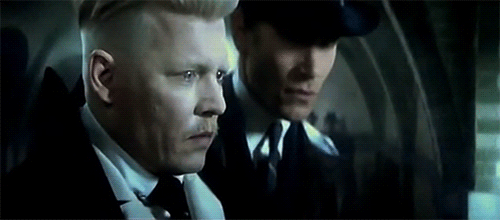 What exactly was the vision he had? And to what extent was Grindelwald telling the truth about what he saw? J.K. Rowling got on the case, replying:
What exactly was the vision he had? And to what extent was Grindelwald telling the truth about what he saw? J.K. Rowling got on the case, replying:
He is a Seer AND he was lying. https://t.co/qUAXwHtpJt — J.K. Rowling (@jk_rowling) December 19, 2016
Die hard Potterheads will remember that a Seer is a witch or wizard who has been gifted with the ability to see into the future, using an unknown entity known as their ‘inner eye.’ A common practice of a Seer is to predict prophecies, such as the prophecy that Grindelwald conjured about the Obscurial.
If one even dares to look closely at his true appearance, one will notice that even Grindelwald’s left eye is grey and misshapen, while his right eye is dark and rounded. Could this have been a hint of Grindelwald’s literal inner eye all along?
The fact that Grindelwald is a Seer makes the character far more fearful and powerful than we first thought, as he effectively has the means to predict future events. This gives the wizard a serious advantage over our heros and, most intriguingly, Albus Dumbledore, especially when it comes to the legendary duel of 1045. Couple this with the fact that Grindelwald is also an Occlumens, and you realize that he can not only predict the others’ moves, but they in turn cannot predict his actions as he can shut them out. How could he possibly have lost to Dumbledore in 1945?
This question can be answered through Albus Dumbledore himself, as well as Professor Minerva McGonnagall. In the books, the former once told Harry Potter that practicing the art of seeing the future is an incredibly difficult task, given the complexity of analyzing every possible action that could ever occur in a single situation, as well as then having to analyze every consequence that could follow.
(Image by GreySmartWolf of DeviantArt)
As for Professor McGonnagall, the Transfiguration teacher had once remarked that ‘true Seers’ are an extremely rare phenomenon, as most tend to make mistakes in their prophecies. This could be very true of Grindelwald, who indeed makes a mistake in his own prediction, as he originally envisioned the troubled Credence Barebone as a Squib, when he was the Obscurial youth all along. If Grindelwald was not a ‘true Seer’, then a false prediction in battle could be a possible reason for his defeat to Dumbledore in the Fantastic Beasts finale.
We are still left with one burning question: just what did Rowling mean by ‘he was lying’?
Some have theorized that Jo’s claims imply Grindelwald had known Credence’s secret all along. Perhaps he was just trying to coax the Obscurus out of Credence to see its true power, by making him angry. However, when watching Colin Farrell’s portrayal on-screen, one feels that GrindelGraves is in a true sense of surprise upon seeing Credence break down the wall in the Orphanage. He even went to seek out Modesty, not even thinking for a moment that Credence would be watching in anger and upset. Grindelwald genuinely seemed to believe that the boy was merely a squib, a pawn in his manipulative chess game, when he turned out to be the most valuable piece.
Grindelwald also doesn’t seem to be a man who plays games like Lord Voldemort, but rather gets the job done straight away. He never took a back seat when searching for the Deathly Hallows after all. Nor did he play tricks when beginning his campaign for ‘The Greater Good.’ He cracked on and found the Elder Wand in no time at all, winning its allegiance before fleeing to America.
No, Potterheads, the answer to how he was lying was rather simple and was in fact in the movie itself. Look back to the scene with himself and Credence at their first and last meeting at the orphanage. As we learned above, Credence is told that Graves sees the child in close proximity to the boy’s mother… yet he fails to mention the fact that Credence’s mother was a witch, and that Credence was a squib in his vision. Instead, he tells Credence that he will become a legendary part of the wizarding world should he find the child.
By the time Credence is revealed to be the Obscurial, we realize that GrindelGraves has been lying the whole time about Credence becoming part of his world, as to him he has no magic ability and is seen as the lowest class in wizarding society.
All in all, as Grindelwald’s powers begin to become clear to us, we see that he is a strong, dangerous being who may even surpass Lord Voldemort. Just what will our heroes do?
